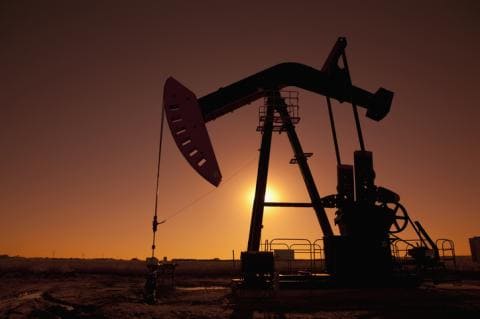Referred to as “black gold” and “the mother of all commodities”, crude oil is used for manufacturing everything from plastics to petroleum, cosmetics to cars, and fabrics to pharmaceuticals.

With so much demand, it's little surprise that oil has been identified as a leading cause of modern wars.
Mostly, however, oil is traded peacefully.
In fact, in 2016, a whopping US$1,374 billion worth of refined and crude oil was traded on the global market, making it the most heavily traded commodity.
Main types of crude oil
The type of crude oil depends on the geographic location of the oil field and the characteristics of the oil itself.
While there hundreds of types of crude oil traded on the global market, two primary types of crude oil serve as global benchmarks for oil prices: West Texas Intermediate and Brent Crude.
- West Texas Intermediate (WTI): As the name suggests, WTI is sourced from US oil fields primarily in Texas, Louisiana and North Dakota. It is referred to as 'light sweet crude oil' due to its low density and low sulphur content. These characteristics make it less expensive to produce and easier to refine than 'heavy' or 'sour' oils. WTI is the main benchmark for oil consumed in the US.
- Brent Crude: Brent oil comes from 15 different oil fields in the North Sea. It is also characterised as a “light and sweet” oil, although it is not as “sweet” or “light” as WTI. Up to two-thirds of global oil contract trades are on Brent.
Main producers of oil
By country, the United States is both the world's biggest producer and consumer of oil. Each day it produces 17.87 million barrels of oil (18% of global production) and consumes 19.69 million barrels (20% of global consumption).
In terms of production, Saudi Arabia comes in second – producing 12.42 million barrels/day (12%) – followed by Russia with 11.40 million barrels (11%). Canada, China and Iraq each produce around 5% of global oil.
On the consumption side of the equation, China follows the US as the biggest user of oil – it consumes 12.79 million barrels/day (14%) while India's usage of 4.44 million barrels/day puts it third.
Saudi Aramco is the reigning global giant in terms of production. In 2018 it was the world's most profitable company, generating US$111.1 billion in net income and producing 13.6 million barrels/day.
Other top producers in 2018 were Sinopec (US$9.2 billion net income), China National Petroleum Corporation (US$7.4 billion), Royal Dutch Shell (US$23.9 billion) and ExxonMobil (US$20.8 billion).
What factors affect oil prices?
Oil prices are highly volatile and heavily influenced by supply, demand and market sentiment.
The Australian Institute of Petroleum lists more than a dozen fundamental drivers of international oil prices, including:
- Natural disasters, war, civil unrest and strikes leading to major supply disruptions
- Seasonal demand and spikes
- Global economic growth and conditions
- Population growth
- Trading activities and strategies
- Inventory management and changes in regional and global supply balances
- Decisions and policies of oil producing countries and nations holding strategic reserves
- Shipping availability and freight rates
- Alternative fuel developments, new oil discoveries and technological progress.
Ways to trade oil
- Oil futures and options: the most direct method of trading is via oil futures – agreements to buy or sell oil at a specific date in the future at a particular price, or options – which allow traders the option of buying or selling at a stated price, within a specific timeframe. Oil futures and options contracts are predominantly traded on the New York Mercantile Exchange (NYMEX) and the Intercontinental Exchange (ICE) where each contract consists of 1000 barrels. There are stringent criteria for trading on ICE and NYMEX.
- Investing: purchasing shares in oil companies or oil exchange traded funds (ETFs) is another way to get exposure to oil trading. An ETF is an investment fund that directly tracks the performance of the oil market and can be bought and sold on a securities exchange. It can give an investor exposure to oil futures without the need for a more complicated futures account.
- Trading via CFDs: the highly liquid and volatile nature of prices make oil a good candidate for trading via CFDs. CMC Markets Commodities allow you to take a position on cash and forward commodity CFDs including Brent and WTI Crude Oil.
You can also trade CFDs on baskets of commodities with CMC’s Energy Index, which is designed to give an indication of how the energy sector is performing. Its constituent commodities are Brent, WTI, heating oil, natural gas, gasoline and low sulphur gasoil.
Oil market overview
Oil is the most actively traded commodity on the planet and is subject to considerable price swings. This makes it a potentially market for those with a strong risk appetite, though it will not suit everybody. oil, natural gas, gasoline and low sulphur gasoil. However, grains just one of a number of options open to commodities traders, including oil, precious metals or coffee, among others. To find out more visit CMC’s Commodities Market.
Investing in CMC Markets derivative products carries significant risks and is not suitable for all investors. You could lose more than your deposits. You do not own, or have any interest in, the underlying assets. We recommend that you seek independent advice and ensure you fully understand the risks involved before trading. Spreads may widen dependent on liquidity and market volatility. The information on this website is prepared without considering your objectives, financial situation or needs. Consequently, you should consider the information in light of your objectives, financial situation and needs. CMC Markets Asia Pacific Pty Ltd ABN 11 100 058 213, AFSL No. 238054 (the derivative product issuer), CMC Markets Stockbroking Limited, Participant of the ASX Group (Australian Securities Exchange) and SSX (Sydney Stock Exchange) and Chi-X (Chi-X Australia), ABN 69 081 002 851, AFSL No. 246381 (the stockbroking services provider) provides the financial products and/or services. It's important for you to consider the relevant Product Disclosure Statement ('PDS') and any other relevant CMC Markets Documents before you decide whether or not to acquire any of the financial products. Our Financial Services Guide contains details of our fees and charges. All of these documents are available at cmcmarkets.com.au or you can call us on 1300 303 888.
Apple, iPad, and iPhone are trademarks of Apple Inc., registered in the U.S. and other countries. App Store is a service mark of Apple Inc. Android is a trademark of Google Inc.


